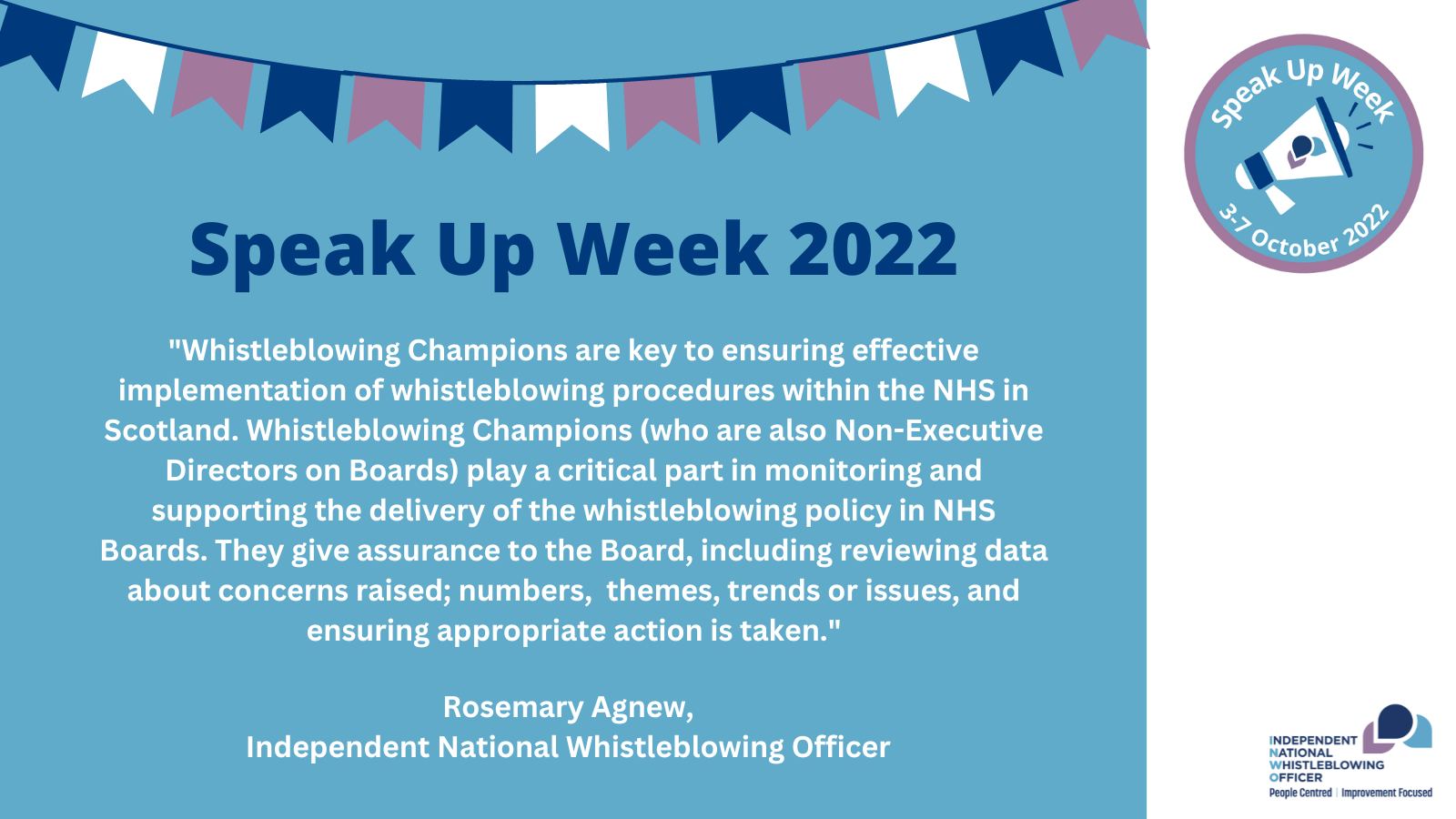
Whistleblowing Champions are individuals within health boards in Scotland, who monitor and support the delivery of the whistleblowing policy in NHS Boards. Unlike other roles, such as the Confidential Contacts, Whistleblowing Champions are not part of the process for receiving whistleblowing concerns. They cannot accept whistleblowing concerns from staff or offer advice and support on individual whistleblowing cases. Neither can they undertake an investigation into concerns raised by staff, students or volunteers. So what do they do?
Oversight and reporting
Whistleblowing Champions are responsible for overseeing the whistleblowing activity within their organisation as a Non-Executive Director sitting on the Board. They provide oversight for the Board of Directors on the organisation’s implementation of the National Whistleblowing Standards (the Standards) and their handling of concerns under these Standards. They can also raise issues with the Board if they observe patterns in the reporting of concerns or issues with the way the Standards are being applied. For this reason they are particularly interested in the number and type of concerns being raised and, crucially, whether people feel confident to speak up with their concerns. They can work with the executive lead for whistleblowing to ensure that the whistleblowing process is working effectively. Some Champions also meet with confidential contacts, staff and union representatives to help them understand what is happening on the frontline.
Guardians of the whistleblowing process
The Whistleblowing Champions in Scotland have formed a network so they can meet regularly to discuss their work, share learning and ideas, and develop a consistent approach to the role. Liz Humphreys (Chair of the Network and Whistleblowing Champion for the Scottish Ambulance Service and Public Health Scotland) and Callum Blackburn (leading the Network’s Support Team and Whistleblowing Champion for the Golden Jubilee National Hospital) recently spoke to us about what they’ve been up to and reflected on where things are after more than a year of working with the Standards.
Liz and Callum told us that the network has been an extremely helpful resource for Whistleblowing Champions, particularly over the last year while it has been in a development phase. The network’s main focus in this period has been on shaping their understanding of the Whistleblowing Champion position and the responsibilities involved. The network has also provided a key point of support for Whistleblowing Champions as they help their Boards to embed the new processes. Liz and Callum told us that they see themselves as the guardians of the whistleblowing process within their organisations.
Now that the foundations have been laid, the network aims to support continuous improvement. Liz and Callum emphasised the significance of the Champion role being one part of a larger picture within an organisation, along with the Confidential Contacts, the executive lead for whistleblowing, other staff support networks like the unions and the practitioners who handle whistleblowing concerns.
Learning from each other
One key thing to emerge from the Whistleblowing Champions network is that not all health boards are the same. Some may be more directly patient-facing than others. Liz and Callum explained that this has presented challenges to developing a consistent shared approach, whilst also allowing individual Champions the flexibility to work out what is right for the boards that they represent.
As a network, the Champions have also grappled with some of the more complex issues of how to ensure the Standards are being applied to areas beyond the immediate health board. For example, within primary care providers and contracted services. We heard that the network has been a vital resource for Champions as a discussion forum and a place to share ideas and be creative in areas where there isn’t a formal or standardised approach in national guidance.
Crucially, we heard from Liz and Callum that the last year has been about learning from each other and reflecting on individual experiences. One example cited was that when the Standards were first introduced in April 2021, the Whistleblowing Champions were unsure where whistleblowing concerns were likely to come from or what they would be about. Interestingly, some Champions have found that the concerns raised have not always come from the areas that they might have expected. This kind of information continues to help them adapt their approach.
There is still plenty of work for the group to do, particularly thinking about how they interpret the whistleblowing data that has been collected over the first year. The network is asking important questions about the information they are seeing and what learning they can take from it. For example do low numbers of whistleblowing concerns show that there are no issues to be addressed, or could it be the opposite, that staff don’t yet feel comfortable speaking up?
Thank you to Liz and Callum for sharing their thoughts and feedback with us for this blog post. We were really encouraged to hear about the value of the network and to see the engagement and enthusiasm shown for the work being done.